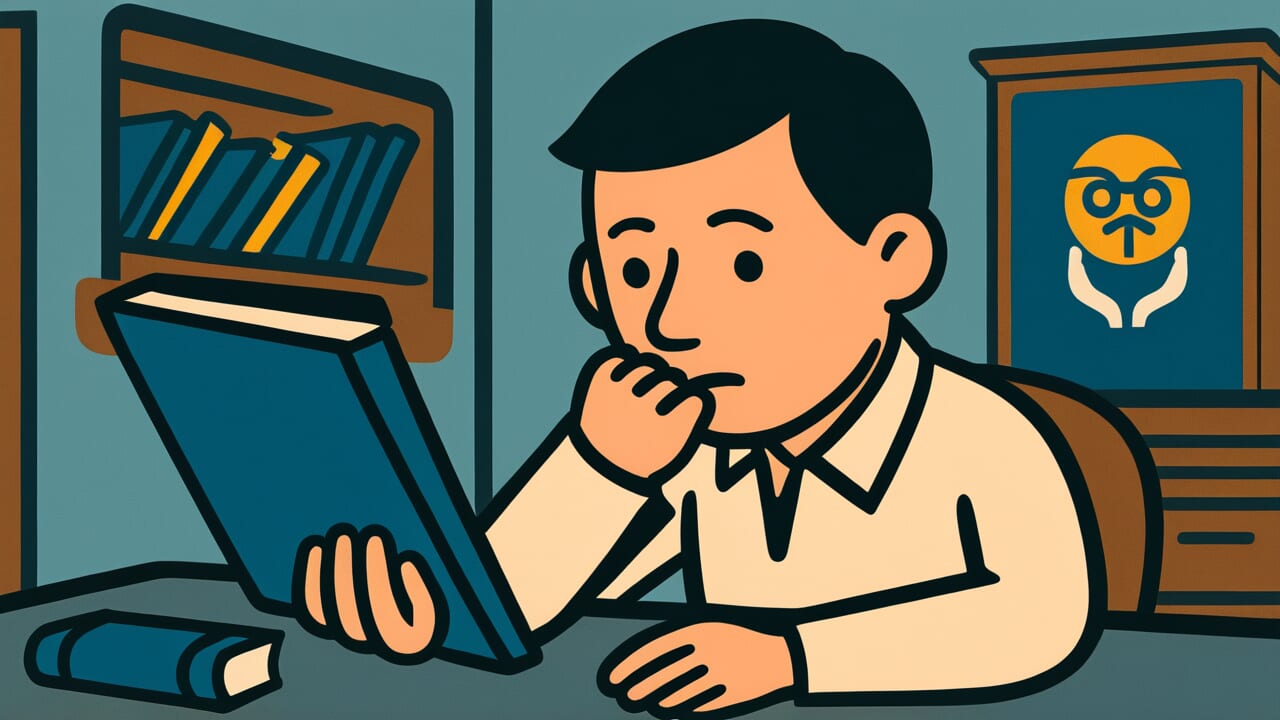How to Read “If you learn but do not think, you will be lost”
Manabite omowazareba sunawachi kūrashi
Meaning of “If you learn but do not think, you will be lost”
This proverb means that learning without deep thinking doesn’t truly stick with you.
You might read books or listen to people and gain knowledge. But if you don’t think about it yourself and digest it, you won’t reach real understanding.
This saying is used to warn against being satisfied with surface-level understanding when gaining knowledge in study or work.
For example, it applies to students who only memorize for tests without thinking about the meaning or background. It also applies to workers who just follow manuals without considering why they do things that way.
We use this expression to clarify the difference between knowledge and understanding.
In our modern world, information overflows and knowledge is easy to obtain. That’s exactly why this teaching becomes more important. Thinking is essential to make that knowledge truly yours.
Origin and Etymology
This proverb comes from the words of Confucius recorded in the ancient Chinese classic “Analects,” specifically in the chapter “Wei Zheng.”
The original text reads “Learning without thought is labor lost; thought without learning is perilous.” The first half became established as a Japanese proverb.
The character “罔” is read as “kūrashi” and means “to be lost without understanding the truth” or “to be unclear.”
Confucius taught his disciples about the method of learning. He explained that simply cramming knowledge doesn’t lead to true understanding.
What’s interesting is that Confucius continued by saying “If you think but do not learn, you will be in danger.”
Learning and thinking are like two wheels of a cart. Either one alone is insufficient.
This teaching came to Japan along with Confucian thought between the Nara and Heian periods.
During the Edo period, it was taught in temple schools as a basic attitude toward learning.
This saying teaches the importance of thinking with your own head, not just memorizing or imitating. It strikes at the essence of education as a universal teaching and has been engraved in Japanese hearts for centuries.
Usage Examples
- He reads many reference books but his grades don’t improve. It’s “if you learn but do not think, you will be lost” – he just reads without thinking.
- We can’t apply what we learned in training to actual practice. That’s what “if you learn but do not think, you will be lost” means.
Universal Wisdom
Humans have both the desire to know and the desire to take it easy. These two urges exist at the same time.
This proverb has been passed down for thousands of years because it sees through this contradictory human nature.
Gaining knowledge is relatively easy. Read a book, listen to a talk, and information comes to you.
But to make it part of your flesh and blood requires the painful process of thinking. People try to escape this pain and become satisfied just collecting knowledge.
It’s like buying ingredients and feeling like you’ve already cooked a meal.
Our ancestors deeply understood this human weakness. They saw that learning and understanding are different things.
Between them lies the active work of “thinking.” Knowledge is just raw material. The real learning is chewing it, digesting it, and making it part of yourself.
This proverb shows a strict yet warm truth: there are no shortcuts to real growth.
People want to take it easy, but they also want to grow. In that conflict, only those who don’t spare the effort of thinking can obtain true wisdom.
When AI Hears This
In information theory, newly received information exists in a “high entropy state.”
Entropy means the degree of disorder. For example, a list of 100 randomly arranged numbers has no clear pattern. This state has lots of information but almost zero usable knowledge.
This is exactly the state of “if you learn but do not think, you will be lost.”
What’s interesting is that human “thinking” works the same as information compression algorithms.
By looking at 100 numbers and thinking, you might discover the pattern “multiples of three are lined up.” The information suddenly compresses.
What was originally 100 numbers can be expressed in just one sentence: “the rule of 3, 6, 9…” This is extracting meaning.
In machine learning, we never use raw data as is. We always perform feature extraction.
For image recognition, we extract features like “round shape” or “red color” from millions of pixels. Without this compression process, data is just a lump of noise.
Confucius saw 2,500 years ago that a compression process is essential to convert information into knowledge.
People who are satisfied just learning are stuck holding a huge uncompressed file. Only through the compression of thinking does information become portable wisdom.
Lessons for Today
Because we live in an information-overflowing modern age, this proverb’s teaching reminds us of something important.
In an era when smartphones easily provide answers, we tend to lose sight of the difference between gaining knowledge and understanding it.
This proverb teaches us the value of stopping to think. When you read a book, think about its content in your own way.
When you hear someone’s opinion, consider why they think that way. When you learn something new at work, imagine how it could apply to other things.
These small accumulations of thinking will grow real wisdom inside you.
What matters isn’t trying too hard to understand perfectly. Just try thinking with your own head, even a little.
That habit will eventually change you from a mere receiver of information into a person who creates wisdom.
The key to making what you learn truly yours is the power of thinking within you.



Comments